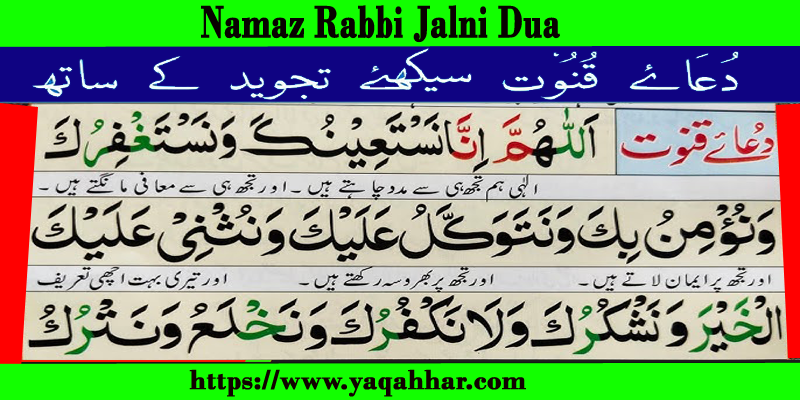The Power of “Namaz Rabbi Jalni Dua” in Islam
Prayer is considered one of the most powerful forms of worship in Islam. Muslims acknowledge the importance of praying five times a day, but some specific duas and supplications can amplify the benefits of prayer. One such dua is the “Namaz Rabbi Jalni Dua,” which translates to “O Allah! Make me among those who establish prayer.” In this blog post, we will discuss the significance of this powerful dua, its benefits, and how to incorporate it into your daily prayers.
1. Understanding the Meaning:
The “Namaz Rabbi Jalni Dua” is derived from a verse in the Quran (Surah Al-Israa) where Allah says, “And say: My Lord! Cause me to enter a sound entrance, and cause me to go forth a sound going forth, and grant me from Thy presence an authority to aid (me).”
This dua is a prayer to Allah to help us establish a strong connection with Him through prayer. It’s a request to make us among the sincere believers who prioritize prayer and to grant us the ability to maintain it consistently.
2. Benefits of reciting this dua:
Reciting the “Namaz Rabbi Jalni Dua” has numerous benefits, including:
– It helps in strengthening our faith and reminding us of Allah’s importance in our lives.
– It boosts our motivation to perform Salah regularly and with concentration.
– It helps us seek Allah’s guidance in overcoming obstacles that might affect our prayer routine.
– It fosters a sense of gratitude towards Allah for giving us the opportunity to pray and communicate with Him.
3. How to incorporate this dua into your daily prayers:
It’s recommended to recite this dua after reciting the Tasbeeh of Sajda (subhanallah rabbi ala) in the second Rakat of any prayer. It’s also advisable to recite this dua after the obligatory prayers. You can start by memorizing the Arabic words and phonetic transliteration and then slowly incorporating it into your daily prayers.
4. The significance of a regular prayer routine:
Establishing a regular prayer routine is a key pillar of Islam. The “Namaz Rabbi Jalni Dua” can be a powerful tool to help you remain steadfast in your prayer routine. Regularly making this dua can help you make a habit of prioritizing prayer and seeking Allah’s guidance in overcoming any obstacles.
The Power of Islamic Dua for Friends: Strengthening Bond and Overcoming Challenges
Steps To Process Namaz Rabbi Jalni Dua
- Begin by standing in Qiyam, which is the standing position in Salat (Islamic Prayer).
- Recite Surah Al-Fatiha and then any other Surah from the Quran.
- Perform Ruku, bowing down and saying “Subhana Rabbiyal Azim” (Glory be to my Lord the Almighty) three times.
- Stand up from the Ruku and say, “Sami’Allah huliman Hamidah, Rabbana lakal Hamd” (Allah hears the one who praises Him; our Lord, praise be to You).
- Go into Sujood (prostration) and recite “Subhana Rabbiyal A’la” (Glory be to my Lord, the Most High) three times.
- Sit up from the first Sujood, and then perform a second Sujood.
- After the second prostration, sit for the first Tashahhud and recite “At-tahiyyatu Lillahi was-salawatu wat-tayyibatu” (All compliments, prayers, and pure words are due to Allah).
- After the first Tashahhud, stand up for the second Rakat and repeat steps 2 to 7.
- After the second Sujood in the second Rakat, remain seated and recite the complete Tashahhud, and after that, recite the “Rabbi jalni dua,” which goes as follows: “Rabbij’alni muqimas salati wa min zurriyati rabbana wa taqabbal dua,” meaning “O my Lord! Make me one who establishes regular Prayer, and also (raise such) among my offspring, O our Lord, and accept my Prayer.”
- Conclude the Prayer by turning the face to the right and saying “Assalamu alaikum wa rahmatullah” and then to the left and repeating the same.
The Power of Praying for Health Recovery in Islam

Dua After Namaz Rabbi Jalni
After completing our salah (prayer), it is a time to ask Allah for his blessings and mercy. Dua after namaz is a beautiful tradition that offers supplication to the Almighty for his guidance and blessings. One such dua, rabbi jalni, is a powerful prayer that asks Allah to make us better versions of ourselves. The phrase translates to “Oh Lord, make me one who establishes prayer, and also (raise) from my offspring, O our Lord, accept my prayer.” As supplicants, we should be humble in our dua after namaz and seek the guidance of Allah in all aspects of our lives. May Allah hear and grant our dua after namaz rabbi jalni.
Understanding the Allahu Samad Wazifa and Its Significance

Benefits Of Nafl Namaz
The practice of nafl namaz, also known as optional prayers, has numerous benefits that can enhance one’s spiritual and personal growth. These additional prayers performed voluntarily outside of the obligatory five daily prayers can bring a sense of calmness and tranquillity to one’s daily routine, ultimately bringing the individual closer to their faith and strengthening their relationship with God. Nafl namaz also serves as a way to seek forgiveness for any sins committed and to reflect on one’s intentions and actions throughout the day. By incorporating nafl namaz into their daily routine, individuals can experience a sense of inner peace and fulfilment, ultimately leading to a more fulfilling and purposeful life.
Dua to Bring Someone Closer to You

Are Sunnah Prayers Nafl
The topic of whether or not Sunnah prayers are considered Nafl can be a confusing one. Some people believe that these two terms are interchangeable, while others argue that they are distinct from one another. Sunnah prayers are the voluntary prayers that Muslims perform before or after the obligatory fard prayers. They are considered to be highly recommended, but they are not mandatory. On the other hand, Nafl prayers are completely voluntary and are performed at any time throughout the day or night. While they may seem similar, there are some key differences between these two types of prayers. Ultimately, whether or not Sunnah prayers are classified as Nafl depends on one’s interpretation and understanding of Islamic teachings.
Surah Taghabun Benefits For Marriage
How Mmany Rakats In Namaz?
Namaz, also known as Salah, is the second pillar of Islam. It is a way of establishing a connection between a person and their creator. Performing Namaz involves various steps, one of which is Rakat. But the question is, how many Rakats are there in Namaz? The answer depends on the time of day and the type of prayer being offered. For instance, the Fajr prayer has two Rakats, while the Maghrib has three. Each Rakat is a unit of prayer, and it involves different positions, such as standing, bowing, prostrating, and sitting. The importance of Namaz and its Rakats cannot be overstated, as every Muslim must perform five times a day.
Secure Ruqyah To Remove Marriage Blockage
Conclusion About Namaz Rabbi Jalni Dua
The “Namaz Rabbi Jalni Dua” is a powerful supplication that can significantly enhance your prayer routine. Reciting this dua regularly can help you establish a strong connection with Allah and motivate you to maintain a regular prayer routine. Incorporating this dua into your daily prayers and making a habit of reciting it can lead to better focus, concentration, and overall spiritual fulfilment. May Allah accept our duas and make us among those who establish prayer consistently. Ameen.

Famous Author


